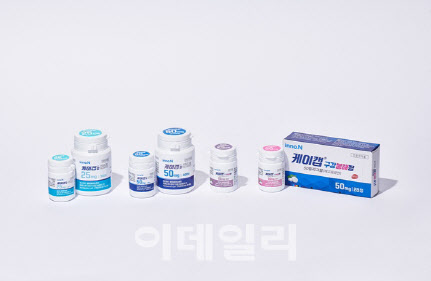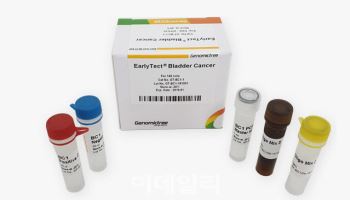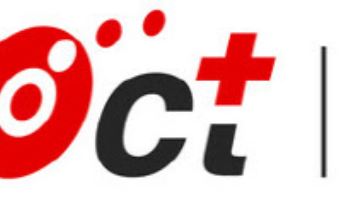Unauthorized reproduction or distribution is illegal and subject to criminal penalties.
Pharm Edaily enforces a zero-tolerance policy and will take strict action.
[Kim Jiwan, Edaily Reporter] On the 24th, Korea’s biopharmaceutical sector surged, fueled by news of successful U.S. clinical trials and the unveiling of next-generation technologies.
HK inno.N hit the upper limit after its gastroesophageal reflux disease (GERD) treatment K-CAB (Tegoprazan) showed outstanding results in its U.S. Phase 3 trial. Inventage Lab and Curatis also surged on expectations surrounding their oral obesity drug development. Geninus rose for the second consecutive day, buoyed by rumors of a major contract.
According to KG Zeroin’s MP DOCTOR (formerly MarketPoint), HK inno.N’s stock hit the upper limit of KRW 48,900 immediately after market open and closed at that price. Geninus rose 14.05% to KRW 1,534, driven by large investors following contract rumors. Inventage Lab saw its stock hit the upper limit amid buzz over its weekly oral obesity drug, which is said to have up to 70 times better absorption than those from Eli Lilly and Novo Nordisk. Curatis, which is majority-owned by Inventage Lab, also hit its upper limit in tandem.
HK inno.N Soars on U.S. Phase 3 Results for K-CAB HK inno.N reported that its GERD treatment K-CAB (Tegoprazan) met both primary and secondary endpoints in two U.S. Phase 3 clinical trials (TRIUMpH), according to its U.S. partner Sebela.
In the trial for erosive esophagitis, K-CAB demonstrated superiority over Takeda’s Lansoprazole in healing rates at weeks 2 and 8, with statistically significant results. In the non-erosive GERD trial, K-CAB showed complete symptom relief for both heartburn (including nighttime heartburn) and acid reflux.
 | | HK inno.N K-CAB. |
|
A company official highlighted praise from Dr. Felice Schnoll-Sussman of Weill Cornell Medical College and Dr. Prateek Sharma, president of the American Society for Gastrointestinal Endoscopy. They commended K-CAB’s differentiated efficacy, not only in relieving heartburn but also in reducing acid reflux?an effect not seen with other treatments.
Adverse events occurred in less than 3% of patients and were mostly mild and transient. Serious adverse events occurred in fewer than 2% of participants, with no significant differences between the Tegoprazan, PPI, and placebo groups.
Sebela plans to complete an additional Phase 3 trial on maintenance therapy for erosive esophagitis by Q3 this year.
Geninus: Institutional Buying on Contract Rumors Geninus’ sharp stock rise over two consecutive days was largely attributed to institutional buying.
On April 22, its trading volume was a mere KRW 22 million. But on April 23, trading value surged by 21,468% to KRW 4.7 billion, and on the 24th, it more than doubled again to KRW 9.9 billion.
 | | Woong-Yang Park, CEO of Geninus and Director of the Samsung Genome Institute at Samsung Medical Center, is interviewed by Edaily at the company‘s headquarters on Jeongui-ro, Songpa-gu, Seoul, in February. (Photo by Jiwan Kim) |
|
While Geninus stated there was no specific news behind the spike, sources from the investment banking (IB) industry pointed to impending contracts in both Korea and Japan. A source indicated that talks were also ongoing with several small-to-medium-sized pharmaceutical firms and that early contracts could serve as a catalyst for broader deals with large pharma companies in the second half of the year.
Geninus acknowledged that while it couldn‘t disclose details, it is planning to offer solutions to pharmaceutical companies.
Inventage Lab & Curatis Hit Upper Limit on Next-Gen Obesity Drug Momentum Inventage Lab and its affiliate Curatis both hit their upper price limits. Inventage Lab became Curatis’ largest shareholder earlier this year through a KRW 25 billion investment, acquiring 15.9 million shares and convertible bonds, giving it a 40% stake.
Their rally was sparked by recent news that Eli Lilly had succeeded in a Phase 3 trial for the world’s first oral GLP-1-based obesity treatment, Orforglipron. This reignited momentum around oral obesity drugs.
On top of this, a media report released after the previous trading session claimed that Inventage Lab had achieved what neither Lilly nor Novo Nordisk could: a “7-day sustained-release oral obesity drug” with 70 times better absorption.
Using its proprietary platform IVL-GeneFluidic, Inventage Lab demonstrated a stable 7-day pharmacokinetic (PK) profile in beagle models, compared to under 24 hours for existing drugs. The company reported an oral absorption rate of approximately 24% over 70 times higher than Novo Nordisk’s Rybelsus (which is less than 1%).
An Inventage Lab official stated the results would be presented at the upcoming American Diabetes Association (ADA) meeting this year and added that licensing talks with global pharmaceutical firms were already underway.
According to Morgan Stanley, the global obesity treatment market is expected to grow from USD 8.9 billion (approx. KRW 12.75 trillion) in 2024 to USD 54 billion (approx. KRW 77.36 trillion) by 2030.





![Xcell Therapeutics Hits Upper Limit...Celemics·QuadMedicine ↑[K-Bio Pulse]](https://image.edaily.co.kr/images/vision/files/NP/S/2026/02/PS26020600366b.jpg)






